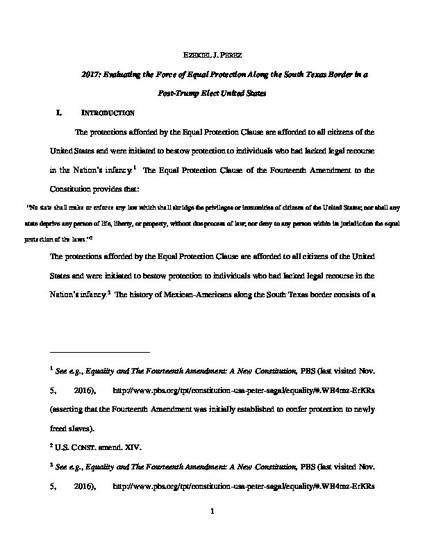
Article
2017: Evaluating the Force of Equal Protection Along the South-Texas Border in a Post Trump Elect United States
The Scholar
(2016)
Abstract
The history of Mexican-Americans along the South Texas border consists of a myriad of violations and challenges of the Equal Protection Clause of the Fourteen Amendment to the Constitution. From the end of the Mexican American War, which led to the incorporation of the land that comprises the southwestern portion of The United States, and the people who lived there prior to the war’s inception, Americans of Mexican descent, especially those who reside in borderlands, have had to overcome perpetual challenges to the legitimacy of their American-ness. These challenges have shifted form over the past hundred-plus years and continue to be both detrimental to those who are the subject of challenge, as well as divisive among those who have the unique ability to bring about change. Change, however, is possible.
Most recently, the election of Donald J. Trump to the presidency of the United States has flared concerns about the status of equality across many minority communities, including Mexican-Americans. The level of unrest, since the Presidential election, among those who live along the border has shifted from concern to panic for many, especially along the southern international border.
Over the last century, the Supreme Court has interpreted the Equal Protection Clause of the Fourteenth Amendment to bridge the inequality gap between majority and minority communities in a variety of ways ranging from school integration, to jury selection, and more recently, marriage equality. The equal protection of law for citizens of the United States can function, in and of itself, as a quasi-legislative vehicle that, in essence, works to guarantee that all citizens are treated with equal dignity and respect, regardless of their individual characteristics, and that the law is not used to undermine access to foundational human rights because of geographic circumstance and/or ethnic background.
The people of the United States are experiencing an unprecedented time in history that has proven divisive among citizens and residents of different backgrounds, and there’s no immediate outlook of change on the horizon. This has been exemplified by the tension surrounding the Black Lives Matter movement, immigration policy, and anti-transgender natured “bathroom bills”. In order to protect the suspect classes of today, the courts must serve, as they have in the past, as a haven for equality in the eyes of the law. They must also function as a blockade against attempts to undermine the rights of vulnerable sects of the population. While the legislature is responsible for drafting law, the protections that have been afforded by previous acts and court resolution can function as a failsafe against violations of human rights.
Keywords
- Equal Protection,
- Mexican American Rights
Disciplines
Publication Date
Spring March 17, 2016
Citation Information
Ezekiel Perez. "2017: Evaluating the Force of Equal Protection Along the South-Texas Border in a Post Trump Elect United States" The Scholar (2016) Available at: http://works.bepress.com/ezekiel-perez/1/